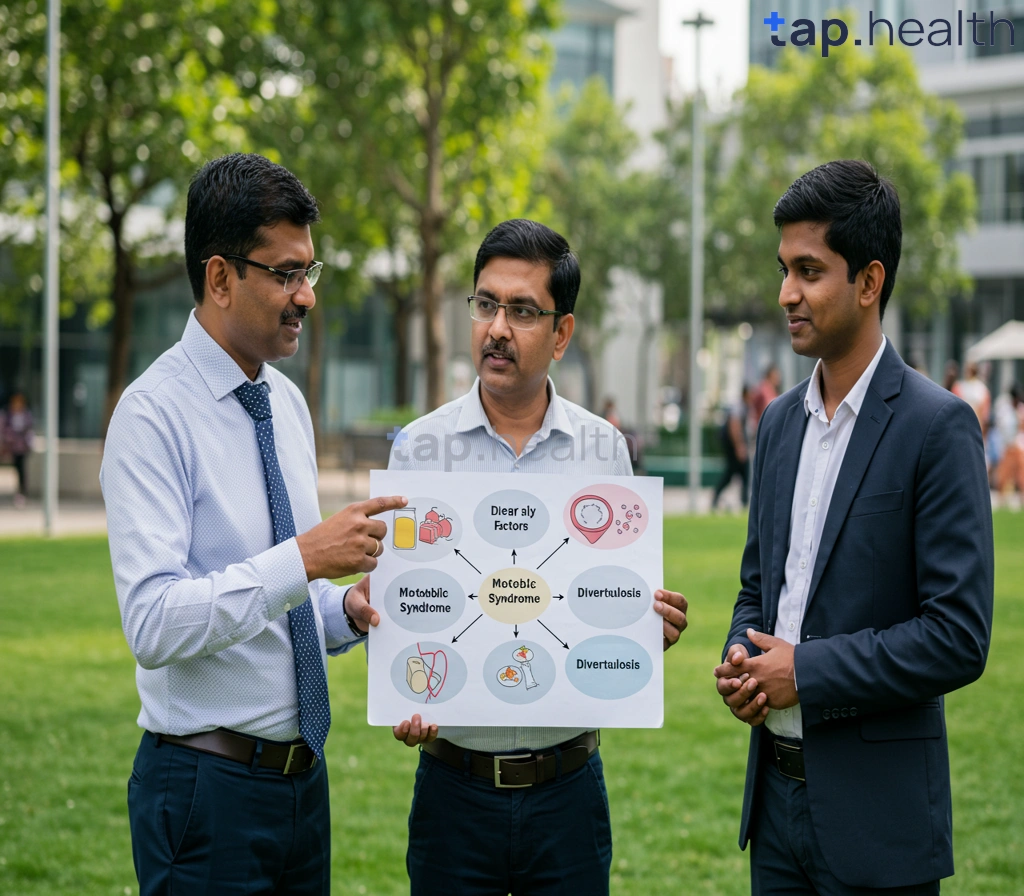Table of Contents
- Dietary Habits, Metabolic Syndrome & Diverticulosis
- Understanding the Diabetes-Diverticulosis Link
- Metabolic Syndrome: How Diet Impacts Diverticulitis Risk
- Can Dietary Changes Manage Diverticulosis and Diabetes?
- Your Guide to Diet and Metabolic Health with Diverticulosis
- Frequently Asked Questions
- References
Are you concerned about your risk of developing metabolic syndrome, diabetes, or diverticulosis? The good news is that understanding the intricate relationship between dietary factors, metabolic syndrome, and diverticulosis can empower you to take proactive steps towards better health. This blog post delves into the compelling connection between these conditions, exploring how specific food choices and lifestyle habits can significantly impact your risk. We’ll uncover practical strategies to manage these conditions and improve your overall well-being. Let’s unpack the science and discover how simple changes can make a big difference in your health journey.
Dietary Habits, Metabolic Syndrome & Diverticulosis
The Interplay of Diet, Metabolism, and Gut Health
The link between diet and health is undeniable, particularly in regions like India and other tropical countries where dietary habits significantly impact the prevalence of metabolic syndrome and diverticulosis. A crucial factor is the high consumption of sugary beverages. Research indicates that daily consumption of these drinks raises the risk of developing diabetes by a staggering 26%. This increased diabetes risk is intrinsically linked to the development of both metabolic syndrome and diverticulosis. Metabolic syndrome, characterized by high blood sugar, abdominal obesity, and high blood pressure, creates an environment conducive to inflammation throughout the body, increasing the risk of diverticulosis.
Dietary Strategies for Prevention
Managing your diet is key to mitigating these risks. Incorporating fiber-rich foods, abundant in Indian and tropical diets (think lentils, beans, and whole grains), is paramount. These foods promote healthy bowel movements, reducing pressure within the colon and thereby lowering the risk of diverticula formation. Simultaneously, focusing on reducing refined carbohydrates and sugary drinks, including those common in many regional beverages, is essential in preventing metabolic syndrome and its associated complications. Prioritizing fruits and vegetables, low-glycemic index carbohydrates, and lean proteins forms a solid foundation for a healthy diet. For more information on improving gut health and managing diabetes, you might find our article on Enhance Gut Health and Manage Diabetes with Prebiotics and Probiotics helpful.
Actionable Steps for Better Gut Health
Regular exercise, alongside dietary changes, plays a vital role. For individuals in India and tropical countries, incorporating culturally relevant physical activities into daily routines can be highly beneficial. Consult with a healthcare professional or registered dietitian to create a personalized dietary plan that addresses your specific needs and cultural preferences. Remember, small, sustainable changes can make a significant difference in preventing and managing metabolic syndrome and diverticulosis. Prioritizing a balanced, fiber-rich diet low in refined sugars is a powerful step towards better long-term health. It’s also important to remember that maintaining a healthy diet plays a crucial role in preventing other serious conditions such as stroke. Learn more about the connection between diet and stroke prevention in The Role of Diet in Preventing and Managing Stroke – Tap Health.
Understanding the Diabetes-Diverticulosis Link
Diabetes significantly impacts overall health, increasing the risk of various complications. One lesser-known connection is the link between diabetes and diverticulosis, a condition affecting the large intestine. While not directly causal, the underlying inflammatory processes and shared risk factors contribute to this association. Poor dietary habits, common in both diabetes management challenges and diverticulosis development, play a crucial role.
Dietary Factors and Metabolic Syndrome
The high prevalence of metabolic syndrome in individuals with diabetes is a key factor. Metabolic syndrome, characterized by abdominal obesity, high blood pressure, high blood sugar, and abnormal cholesterol levels, creates an environment conducive to inflammation throughout the body. This chronic inflammation can weaken the colon’s wall, increasing susceptibility to diverticula (small pouches) formation, a hallmark of diverticulosis. In Indian and tropical countries, diets often high in refined carbohydrates and low in fiber may exacerbate these risks. The connection between diabetes and other metabolic issues is further explored in Understanding the Link Between Diabetes and Obesity.
Managing Risk Through Diet and Lifestyle
A high-fiber diet is crucial in preventing and managing both diabetes and diverticulosis. Fiber adds bulk to the stool, promoting regular bowel movements and reducing pressure on the colon, thus decreasing the risk of diverticula formation. Regular exercise and maintaining a healthy weight also play a vital role in controlling blood sugar levels and reducing inflammation, factors directly impacting both conditions. Considering the high prevalence of diabetes in many Indian and tropical regions, focusing on preventative dietary strategies is paramount. Consulting a healthcare professional or registered dietitian for personalized dietary advice is essential, particularly if you have diabetes or suspect you may be at risk of diverticulosis. They can help tailor a plan to manage both conditions effectively. Understanding the link between diabetes and other organ complications, such as the liver, can also be beneficial. For more information, see our article on The Link Between Diabetes and Fatty Liver.
Metabolic Syndrome: How Diet Impacts Diverticulitis Risk
Metabolic syndrome, a cluster of conditions including high blood sugar, high blood pressure, and excess abdominal fat, significantly increases the risk of diverticulitis, especially in populations prevalent in Indian and tropical countries. This is particularly concerning given the high prevalence of diabetes in these regions. Poor dietary habits are a primary driver of both metabolic syndrome and diverticulitis. A diet high in refined carbohydrates, saturated fats, and processed foods contributes to insulin resistance, weight gain, and inflammation – all key factors in the development of metabolic syndrome. This, in turn, weakens the intestinal wall, making it more susceptible to diverticula formation and subsequent infection (diverticulitis).
Dietary Strategies for Reduced Risk
Incorporating fiber-rich foods, such as fruits, vegetables, and whole grains, is crucial. These foods promote healthy bowel movements, reducing pressure within the colon and lessening the likelihood of diverticula formation. Reducing refined carbohydrates and saturated fats is equally important. Switching to lean protein sources, such as fish and lentils, common in many Indian and tropical cuisines, can significantly improve metabolic health. Furthermore, increasing your intake of foods rich in antioxidants, like berries and leafy greens, can help combat inflammation. Understanding the connection between What’s the Connection Between Gut Health and Your Diet? is also vital in mitigating risk.
The Diabetes Connection & Regional Considerations
The link between diabetes, metabolic syndrome, and diverticulitis is undeniable. The high prevalence of diabetes in India and tropical countries necessitates a heightened focus on preventive measures. Remember, nearly 15% of diabetics experience foot ulcers in their lifetime, with high amputation risks. Maintaining healthy blood sugar levels is therefore paramount in managing overall health, including reducing the risk of diverticulitis. Adopting a balanced diet rich in fiber, lean protein, and antioxidants is a powerful step towards preventing both metabolic syndrome and its associated complications. Consult a healthcare professional or registered dietitian to personalize a dietary plan that suits your individual needs and cultural context. For those dealing with other inflammatory conditions, learning how Managing Osteoarthritis with Diet can offer valuable insights into managing inflammation through dietary choices.
Can Dietary Changes Manage Diverticulosis and Diabetes?
Managing diverticulosis and diabetes often intertwines with dietary choices, particularly in regions like India and tropical countries where certain dietary habits are prevalent. The connection lies in metabolic syndrome, a cluster of conditions including high blood sugar, abdominal obesity, and high blood pressure, which increases the risk of both diverticulosis and type 2 diabetes. Dietary changes are crucial in mitigating these risks.
The Role of Carbohydrates
For individuals with diabetes, careful carbohydrate management is paramount. While the specific needs vary, a common guideline suggests aiming for 45–60 grams of carbs per meal. This isn’t a rigid rule; individual requirements depend on factors like activity level, medication, and overall health. In India, for example, a diet rich in refined carbohydrates like white rice and sugary sweets can significantly impact blood sugar levels, exacerbating both diabetes and potentially contributing to diverticulosis through inflammation. Consider exploring different approaches to carbohydrate intake, perhaps even looking into resources like Creating Diabetes-Friendly Dishes for the Holidays for inspiration.
Fiber’s Protective Effect
High-fiber diets, abundant in fruits, vegetables, and whole grains, are vital for both conditions. Fiber promotes healthy bowel movements, reducing strain on the digestive system and lessening diverticulitis flare-ups. In many tropical countries, readily available fruits and vegetables offer a natural pathway to increase fiber intake, significantly benefiting both diabetes management and diverticulosis prevention. Focusing on incorporating these foods into your daily meals is essential.
Regional Considerations
Adapting dietary changes to suit regional preferences is key. In India and tropical countries, incorporating traditional high-fiber foods like lentils (dal), various vegetables, and whole grains like jowar and bajra can be a natural and effective approach. Substituting refined carbohydrates with these options provides significant health benefits.
Actionable Steps
Consult a doctor or registered dietitian to create a personalized dietary plan that suits your specific needs and preferences. They can help you navigate carbohydrate intake, increase fiber, and adapt your diet to manage both diverticulosis and diabetes effectively, considering your regional dietary habits. Taking proactive steps towards dietary change is crucial for long-term health. It’s also important to consider the impact of different dietary approaches; for example, you might want to research the pros and cons of various diets such as the Is the Carnivore Diet Good for Diabetes? before making any drastic changes.
Your Guide to Diet and Metabolic Health with Diverticulosis
Understanding the Interplay of Diet, Metabolism, and Diverticulosis
Diverticulosis, the presence of small pouches in the colon, is increasingly common, especially in populations with high-fiber diets. While not always problematic, it can lead to diverticulitis (inflammation) and significant discomfort. A crucial factor often overlooked is the connection between diet, metabolic syndrome, and the development or worsening of diverticulosis, particularly in individuals also managing diabetes. Metabolic syndrome, characterized by high blood sugar, abdominal obesity, and high blood pressure, significantly increases the risk of complications. This is especially relevant in the context of Indian and tropical countries where dietary habits and lifestyle factors can contribute to these conditions.
Dietary Strategies for Improved Metabolic Health and Diverticulosis Management
Managing diabetes and diverticulosis often involves similar dietary approaches. A diet rich in soluble fiber, found in fruits, vegetables, and legumes, is crucial. Soluble fiber helps regulate blood sugar levels, easing the burden on the pancreas and promoting better metabolic control in individuals with diabetes. Simultaneously, it adds bulk to the stool, easing bowel movements and reducing pressure on the colon, which is beneficial for those with diverticulosis. Incorporating whole grains, such as brown rice and oats, common in Indian and tropical cuisines, further enhances this effect. For specific dietary recommendations tailored to managing diabetes, you might find Diet Chart for Diabetic Patients to Control Diabetes helpful.
Addressing the Challenges of Diabetic Neuropathy
For individuals with diabetes, the potential complication of diabetic neuropathy, affecting 30-50% of patients, needs careful consideration. Diabetic neuropathy causes pain and reduced mobility, potentially impacting dietary choices and overall health. A focus on nutritious, easily digestible foods, combined with regular medical check-ups, is essential. Consulting a doctor or a registered dietitian is crucial for creating a personalized plan, particularly in the context of managing diabetes, diverticulosis, and potential complications like diabetic neuropathy. Weight management is also crucial, and for those looking to lose weight while managing diabetes, How to Lose Weight with Diabetes Diet Plan offers valuable insights.
Taking Action for Better Health
Prioritize regular consultations with your healthcare provider to monitor your blood sugar levels, manage your diabetes effectively, and discuss any concerns about diverticulosis. Adopting a balanced, fiber-rich diet tailored to your needs can significantly improve your metabolic health and reduce the discomfort associated with diverticulosis. Remember, proactive management is key to a healthier and more comfortable life.
Frequently Asked Questions on Dietary Factors, Metabolic Syndrome, and Diverticulosis: A Diabetes Connection
Q1. What is the link between diet, metabolic syndrome, and diverticulosis?
Metabolic syndrome, often caused by poor diet, significantly increases your risk of diverticulosis. High sugar intake raises your diabetes risk, worsening both conditions.
Q2. How can I reduce my risk of developing diverticulosis?
A diet rich in fiber (from foods like legumes and whole grains) and low in refined carbs and sugary drinks is crucial. Regular exercise and maintaining a healthy weight are also important.
Q3. What role does diabetes play in this connection?
High sugar consumption increases the risk of diabetes, which in turn, worsens the chances of developing diverticulosis. Managing diabetes effectively is key to mitigating this risk.
Q4. Are there specific dietary recommendations to prevent or manage these conditions?
Focus on a high-fiber diet, including plenty of fruits, vegetables, legumes, and whole grains. Limit processed foods, sugary drinks, and refined carbohydrates. A healthcare professional can create a personalized plan.
Q5. When should I consult a doctor about diverticulosis or its related factors?
Consult a doctor if you have diabetes, diverticulosis, or concerns about your risk factors. They can help create a personalized plan considering your dietary preferences and health status.
References
- A Practical Guide to Integrated Type 2 Diabetes Care: https://www.hse.ie/eng/services/list/2/primarycare/east-coast-diabetes-service/management-of-type-2-diabetes/diabetes-and-pregnancy/icgp-guide-to-integrated-type-2.pdf
- DIETS: Diabetic Insulin Management System in Everyday Life : https://arxiv.org/pdf/2411.12812




